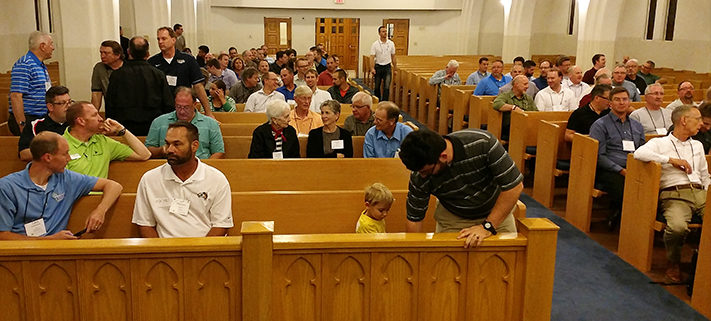Scripture alone is the authority for all Christian teachings.
John A. Braun
Martin Luther stood before those assembled at the Diet of Worms and proclaimed, “Here I stand.” His bold confession of faith hardened the opposition to him. Emperor Charles V wondered why he had put up with Luther for so long. After his confession, Luther remained in Worms a short time and then began the journey back to Wittenberg under the protection of the Emperor’s promise of safe conduct.
He did not make it to Wittenberg. On May 4, 1521, Luther was abducted along the way. With crossbow and sword, horsemen forced Luther out of the wagon with only his New Testament and Hebrew Bible. He ran next to the horses for a short distance and then mounted and rode off. At 11:00 that night, they arrived at the Wartburg Castle. His kidnapping had been arranged for his own safety, and for the next months, Luther became Knight George behind the walls of the castle.
In the meantime, the Emperor and those remaining in Worms issued the Edict of Worms. Luther officially became guilty of high treason because he would not revoke his teaching.
God’s Word in the hands of the people
Safe at the Wartburg, Luther kept busy. His friends in Wittenberg communicated with him by letter, delivered books to him so he could study and write, and kept him informed. Some thought Luther was dead, but soon his new writings began to appear.
In one of his letters, dated Dec. 18, 1521, and addressed to his friend John Lang, Luther set a remarkable goal for his remaining time in the castle: “I shall be hiding here until Easter. In the meantime I shall . . . translate the New Testament into German, an undertaking our friends request. I hear you are also working on this. Continue as you have begun. I wish every town would have its interpreter, and that this book alone, in all languages, would live in the hands, eyes, ears, and hearts of all people” (Luther’s Works 48:356).
So Luther set to work, no doubt, using the recent Greek edition Erasmus had published in 1516. He did not translate from the Latin Vulgate, the only authorized Bible at the time. This work, like much of his other work, defied the accepted teachings of his day. Translating the Bible into the common language of the people was considered a desecration of the sacred text of the Bible. But Luther’s goal was to put God’s Word into the hands of people in a way that they could understand it for themselves.
In the quiet, uninterrupted time Luther had at the castle, he made great progress. On March 1, 1522, he returned to Wittenberg with a rough draft of the New Testament. In just under three months, Luther had done what most considered impossible. His colleagues in Wittenberg considered it astounding.
In Wittenberg, Luther recruited Philip Melanchthon and George Spalatin, among others, to help perfect the translation. Melanchthon was the eminent Greek scholar on the faculty of the University of Wittenberg, and they asked Spalatin to help with some of the German.
The work that came from their efforts went to the printer, Melchior Lotther, in July and kept three presses busy. Workers were not allowed to take any of the completed pages out of the workshop for fear they might pass them on to another printer.
The printing was done in late September. Their efforts became known as the September Testament or September Bible. It was a huge success; estimates suggest that 5,000 copies were sold in two months. The approximate cost was between $15 and $25. A December Testament followed, correcting some of the typos and other errors. The translation of the Old Testament began at once, but it was not completed until 1534—12 years later. In those 12 years, one estimate is that 200,000 New Testaments were sold.
What a great blessing we have as Christians five hundred years after Luther! We have the Bible in our own language. If we can’t read Greek, Hebrew, or even German, we can read God’s Word in English. Today anyone can walk into almost any bookstore and buy the version they prefer. Technology even gives us the choice of a wide range of translations on our mobile devices. Luther helped usher in that freedom. The Bible is in the hands of the people, just as Luther planned.
Bound by the Scriptures
At Worms Luther had declared, “I am bound by the Scriptures.” He said clearly that both church councils and popes could make mistakes and that they often contradicted each other. The only authority he could trust was the Scriptures. Even before the Diet of Worms he had rejected the decrees of the Roman church on indulgences, claiming that all human words and authority are “not above, but under the Word of God” (Luther’s Works 31:266-7). The message of the Bible was important; Luther understood Christian faith as “nothing else than believing what God promises and reveals” (Luther’s Works 31:270-1).
We too are bound by the Scriptures. All human ideas change; God’s Word does not. “Abraham believed God, and it was credited to him as righteousness” (Romans 4:3). The apostles also believed the word of the same God and were credited with righteousness. Luther believed the Scriptures and received the same righteousness, forgiveness, and life. We are also declared righteous by God for the sake of Jesus by our faith in God’s promises revealed in the Bible.
Being bound by the Scriptures means we do not say more than the Scriptures, but we do not say less than the Scriptures either. When the Bible doesn’t clarify things, we have a choice about what to believe. It is neither commanded nor forbidden.
It also means that even if all our friends and the entire world believe something different from what God says, we hold to what God says in his Word. No higher authority exists. We treasure one Christ for salvation, one source of truth, and one comfort for eternity. Here we stand. God help us.
John Braun, chairman of the Reformation 500 Committee, is the executive editor of Forward in Christ.
As we celebrate the 500th anniversary of the Reformation, this is the first in a 12-part series on our Lutheran heritage.
Luther still speaks
“Sola Scriptura,” Luther correctly preached. Nothing more and nothing less than what Scripture said was to be taught. In a Lenten sermon he declared, “Everyone should flee, as from the devil himself, the sects and enthusiasts who lead us away from the Word and Scripture to human ideas. . . . For this is leading from a rock into quicksand. The more you try to gain a footing there, the deeper you sink, and it is impossible to avoid finally going down. God’s Word alone is the true, abiding rock on which a person can depend with certainty” (What Luther Says, Vol. 3, #4740).
There’s a lot of quicksand around us today. We see church bodies that once stood on the rock of God’s Word sinking into the quicksand of human teaching. For them, “thus saith the Lord” has become “yea, hath the Lord said?” as they twist or even ignore God’s clear Word to suit their own purposes.
Others in increasing numbers treat God’s Word as irrelevant. In sinful pride the creature ignores its Creator’s voice, marching instead to the beat of its own drummer. Reason’s prideful voice, materialism’s selfish refrain, universalism’s acceptance of anything as truth drown out the Word and leave man in smug indifference to the eternal truths of God’s Word.
And we? We pride ourselves on being a church body that holds to the Word. We love to sing, “God’s Word Is Our Great Heritage.” But let’s remember how that is possible. With Luther we still stand on the rock of the Word because the Lord has kept us there. Today, perhaps more than ever, we need to pray, “Lord, grant while worlds endure, we keep its teachings pure throughout all generations.”
Richard E. Lauersdorf is a pastor at Good Shepherd, West Bend, Wisconsin.
Do you have a manuscript, idea, or story from your own life you’d like to share for use in Forward in Christ or on wels.net? Use our online form to share it to our editorial office for consideration.
Get inspirational stories, spiritual help, and synod news from Forward in Christ every month. Print and digital subscriptions are available from Northwestern Publishing House.
Author: John A. Braun
Volume 104, Number 1
Issue: January 2017
Copyrighted by WELS Forward in Christ © 2021
Forward in Christ grants permission for any original article (not a reprint) to be printed for use in a WELS church, school, or organization, provided that it is distributed free and indicate Forward in Christ as the source. Images may not be reproduced except in the context of its article. Contact us







